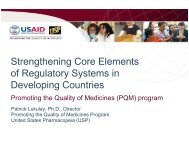A Quality Management System for Mental Health Professionals
A Quality Management System for Mental Health Professionals
A Quality Management System for Mental Health Professionals
- No tags were found...
Create successful ePaper yourself
Turn your PDF publications into a flip-book with our unique Google optimized e-Paper software.
A <strong>Quality</strong> <strong>Management</strong> <strong>System</strong><br />
<strong>for</strong> <strong>Mental</strong> <strong>Health</strong> <strong>Professionals</strong><br />
Harold Alan Pincus, MD<br />
Professor and Vice Chairman, Department of Psychiatry<br />
Co-Director, Irving Institute <strong>for</strong> Clinical and Translational Research<br />
Columbia University<br />
Director of <strong>Quality</strong> and Outcomes Research<br />
New York-Presbyterian Hospital<br />
Senior Scientist<br />
RAND Corporation
IOM Recommendations<br />
A comprehensive quality-management system <strong>for</strong> all<br />
mental health professionals<br />
• Well-defined scopes of practice and clinical privileging of<br />
all mental health-care providers<br />
• Promotion of evidence-based practices <strong>for</strong> treatment and<br />
monitoring of results<br />
• Focused training in the particular mental and related<br />
general medical conditions in TRICARE population and<br />
in military cultural competence<br />
• A systematic process <strong>for</strong> continued professional<br />
education and training<br />
• Development and application of quality measures to<br />
assess per<strong>for</strong>mance of providers<br />
• <strong>System</strong>atic monitoring of process and outcomes of care<br />
at all levels of health-care system and application of<br />
effective quality-improvement strategies<br />
IOM Tricare Study Meeting<br />
October 13.2010; Washington, DC<br />
2
Structure-Process-Outcome (SPO)<br />
Model of <strong>Health</strong> Care <strong>Quality</strong><br />
Structure of Care<br />
Process of Care<br />
Outcomes of Care<br />
“Structural components have a propensity to influence the process of care . . .<br />
changes in the process of care, including variations in quality, will influence the<br />
outcomes of care, broadly defined. Hence, structural effects on outcomes are<br />
mediated through process.”<br />
--Donabedian A (1980)<br />
IOM Tricare Study Meeting<br />
October 13.2010; Washington, DC<br />
3
“Crossing the <strong>Quality</strong> Chasm”<br />
IOM Tricare Study Meeting<br />
October 13.2010; Washington, DC<br />
4
Studies Documenting the “<strong>Quality</strong> Gap”<br />
• Literature reviews conducted by RAND<br />
– Over 70 studies documenting quality shortcomings<br />
• Large gaps between the care people should receive<br />
and the care they do receive<br />
– true <strong>for</strong> preventive, acute and chronic<br />
– across all health care settings<br />
– all age groups and geographic areas<br />
• Only 55% chance of getting appropriate care<br />
(Schuster et al, MMFQ,1998; updated 2000; McGlynn et al, NEJM 2003)<br />
IOM Tricare Study Meeting<br />
October 13.2010; Washington, DC<br />
5
Crossing the <strong>Quality</strong> Chasm<br />
“<strong>Quality</strong> problems occur typically<br />
not because of failure of goodwill,<br />
knowledge, ef<strong>for</strong>t or resources<br />
devoted to health care, but<br />
because of fundamental<br />
shortcomings in the ways care is<br />
organized”<br />
The American health care<br />
delivery system is in need of<br />
fundamental change. The current<br />
care systems cannot do the job.<br />
Trying harder will not work:<br />
Changing systems of care will!<br />
IOM Tricare Study Meeting<br />
October 13.2010; Washington, DC<br />
6
Six Aims of <strong>Quality</strong> <strong>Health</strong> Care<br />
1. Safe – avoids injuries of care<br />
2. Effective – provides care based on<br />
scientific knowledge and avoids services<br />
not likely to help<br />
3. Patient-centered – respects and<br />
responds to patient preferences, needs,<br />
and values<br />
IOM Tricare Study Meeting<br />
October 13.2010; Washington, DC<br />
7
Six Aims of <strong>Quality</strong> <strong>Health</strong> Care<br />
(continued)<br />
4. Timely – reduces waits and sometimes<br />
harmful delays <strong>for</strong> those receiving and<br />
giving care<br />
5. Efficient – avoids waste, including waste<br />
of equipment, supplies, ideas and energy<br />
6. Equitable – care does not vary in quality<br />
due to personal characteristics (gender,<br />
ethnicity, geographic location, or socioeconomic<br />
status)<br />
IOM Tricare Study Meeting<br />
October 13.2010; Washington, DC<br />
8
Ten Rules <strong>for</strong> Achieving the Aims<br />
Old Rules<br />
1. Care is based on visits.<br />
2. Professional autonomy<br />
drives variability.<br />
3. <strong>Professionals</strong> control<br />
care.<br />
4. In<strong>for</strong>mation is a record.<br />
5. Decisions are based<br />
upon training and<br />
experience.<br />
IOM Tricare Study Meeting<br />
October 13.2010; Washington, DC<br />
New Rules<br />
1. Care is based upon<br />
continuous healing<br />
relationships.<br />
2. Care is customized to<br />
patient needs and<br />
values.<br />
3. The patient is the<br />
source of control.<br />
4. Knowledge is shared<br />
and in<strong>for</strong>mation flows<br />
freely.<br />
5. Decision making is<br />
evidence-based.<br />
9
Ten Rules <strong>for</strong> Achieving the Aims<br />
Old Rules<br />
6. “Do no harm” is an<br />
individual clinician<br />
responsibility.<br />
7. Secrecy is necessary.<br />
8. The system reacts to<br />
needs.<br />
9. Cost reduction is<br />
sought.<br />
10. Preference <strong>for</strong><br />
professional roles over<br />
the system.<br />
New Rules<br />
6. Safety is a system<br />
responsibility.<br />
7. Transparency is<br />
necessary.<br />
8. Needs are anticipated.<br />
9. Waste is continuously<br />
decreased.<br />
10. Cooperation among<br />
clinicians is a priority.<br />
IOM Tricare Study Meeting<br />
October 13.2010; Washington, DC<br />
10
Four Levels of Care<br />
• Level A: the experience of patients<br />
• Level B: the functioning of small units of care<br />
delivery (“microsystems” such as a cardiac<br />
surgical team, ACT team)<br />
• Level C: the functioning of organizations that<br />
house or support microsystems (such as clinics<br />
and hospitals)<br />
• Level D: the environment of policy, payment,<br />
regulation, accreditation, and other factors that<br />
influence the organization at Level C<br />
IOM Tricare Study Meeting<br />
October 13.2010; Washington, DC<br />
11
Evidence-Based Chronic (Planned) Care<br />
Approaches <strong>for</strong> Treating Depression<br />
Are Effective<br />
Community<br />
Resources and Policies<br />
Self-<br />
<strong>Management</strong><br />
Support<br />
<strong>Health</strong> <strong>System</strong><br />
<strong>Health</strong> Care Organization<br />
Delivery<br />
<strong>System</strong><br />
Design<br />
Decision<br />
Support<br />
Clinical<br />
In<strong>for</strong>mation<br />
<strong>System</strong>s<br />
In<strong>for</strong>med, Empowered<br />
Patient and Family<br />
Productive Interactions<br />
Patient-Centered Coordinated<br />
Timely and Evidence-<br />
Efficient<br />
Based and Safe<br />
Improved Outcomes<br />
IOM Tricare Study Meeting<br />
October 13.2010; Washington, DC<br />
Prepared, Proactive<br />
Practice Team<br />
12
IOM Tricare Study Meeting<br />
October 13.2010; Washington, DC<br />
13
Two Phenomena Central to the<br />
Committee’s Work and Findings<br />
• Co-occurrence of mental, substance-use,<br />
and general health conditions (and<br />
substantial societal burden)<br />
• The differences in M/SU health services<br />
delivery compared to general health care<br />
IOM Tricare Study Meeting<br />
October 13.2010; Washington, DC<br />
14
Six Problems in the <strong>Quality</strong> of<br />
M/SU <strong>Health</strong> Care<br />
• Problem 1: Obstacles to patient-centered care<br />
• Problem 2: Weak measurement and<br />
improvement infrastructure<br />
• Problem 3: Poor linkages across MH/SU/GH<br />
• Problem 4: Lack of involvement in National<br />
<strong>Health</strong> In<strong>for</strong>mation Infrastructure<br />
• Problem 5: Insufficient work<strong>for</strong>ce capacity <strong>for</strong> QI<br />
• Problem 6: Differently structured marketplace<br />
IOM Tricare Study Meeting<br />
October 13.2010; Washington, DC<br />
15
Overarching Recommendation 1<br />
The aims, rules, and strategies <strong>for</strong><br />
redesign set <strong>for</strong>th in Crossing the <strong>Quality</strong><br />
Chasm should be applied throughout<br />
M/SU health care on a day-to-day<br />
operational basis but tailored to reflect the<br />
characteristics that distinguish care <strong>for</strong><br />
these problems and illnesses from general<br />
health care.<br />
IOM Tricare Study Meeting<br />
October 13.2010; Washington, DC<br />
16
<strong>Mental</strong>, Substance-Use and<br />
General <strong>Health</strong><br />
CONCLUSION<br />
Improving care delivery and outcomes <strong>for</strong> anyone<br />
depends upon improving care and outcomes <strong>for</strong> the<br />
others.<br />
OVERARCHING RECOMMENDATION 2<br />
<strong>Health</strong> care <strong>for</strong> general, mental, and substance-use<br />
problems and illnesses must be delivered with an<br />
understanding of the inherent interactions between the<br />
mind / brain and the rest of the body.<br />
IOM Tricare Study Meeting<br />
October 13.2010; Washington, DC<br />
17
Problem 2: Weak Measurement<br />
and Improvement Infrastructure<br />
1. Clinical assessment and treatment practices not yet<br />
standardized and classified <strong>for</strong> use in administrative<br />
datasets<br />
2. Outcome measurement not widely applied in spite of<br />
reliable and valid instruments (“measurement-based<br />
care”)<br />
3. Dissemination of advances often fails to use effective<br />
strategies<br />
4. Per<strong>for</strong>mance measurement <strong>for</strong> M/SU health care has<br />
not received sufficient attention in private or public<br />
sector<br />
5. QI methods not yet permeating day-to-day operations<br />
IOM Tricare Study Meeting<br />
October 13.2010; Washington, DC<br />
18
Preparing <strong>for</strong> the Future<br />
Consumer Participation<br />
Leadership<br />
(PCP/MH/SUD)<br />
Support<br />
Standardize Practice Elements<br />
– Clinical assessment<br />
– Interventions<br />
– IT infrastructure<br />
Develop Guidelines<br />
– <strong>Mental</strong> health<br />
– Substance use<br />
– General health<br />
Measure Per<strong>for</strong>mance<br />
– For each “6P” level<br />
– Across silos<br />
Improve Per<strong>for</strong>mance<br />
– Learn<br />
– Reward<br />
Strengthen Evidence Base<br />
– Document stakeholder value<br />
– Evaluate effective strategies<br />
– Translate from bench to bedside<br />
to community<br />
Clinical<br />
(PCP/MH/SUD)<br />
Perspectives<br />
Integrative Processes<br />
IOM Tricare Study Meeting<br />
October 13.2010; Washington, DC<br />
19
Create/Engage/Integrate Leadership<br />
• Consumers/Users<br />
• Clinicians<br />
• Administrators<br />
• Policy makers<br />
• Across MH/SU/GH<br />
IOM Tricare Study Meeting<br />
October 13.2010; Washington, DC<br />
20
Standardize Practice Elements<br />
• Clinical assessment<br />
• Interventions<br />
• IT infrastructure<br />
IOM Tricare Study Meeting<br />
October 13.2010; Washington, DC<br />
21
Develop Guidelines<br />
• <strong>Mental</strong> health<br />
• Substance use<br />
• General health<br />
IOM Tricare Study Meeting<br />
October 13.2010; Washington, DC<br />
22
IOM Tricare Study Meeting<br />
October 13.2010; Washington, DC<br />
23
• Evidence-Based Practices<br />
– specific interventions<br />
– medications, psychotherapies, team-based, etc.<br />
– appropriateness/fidelity measurement<br />
– training, supervision<br />
• Measurement-Based Care<br />
– clinical measures (e.g. HA1c, PHQ-9)<br />
– systematic, consistent, longitudinal<br />
– action-oriented<br />
• Best Practices/Context<br />
– accessibility<br />
– patient centeredness<br />
– cultural competence<br />
IOM Tricare Study Meeting<br />
October 13.2010; Washington, DC<br />
24
Measure Per<strong>for</strong>mance<br />
• “You can’t improve what you don’t measure”<br />
• Develop quality metrics (indicators)<br />
- Structure<br />
-Process<br />
- Outcomes<br />
• Across silos of MH/SU/GH<br />
• At each “P” level<br />
• Multiple activities/No stewardship<br />
IOM Tricare Study Meeting<br />
October 13.2010; Washington, DC<br />
25
“66 P” P Conceptual Framework<br />
Patient /<br />
Consumer<br />
Providers<br />
Practice /<br />
Delivery <strong>System</strong>s<br />
Plans<br />
Purchasers<br />
(Public / Private)<br />
Populations<br />
and Policies<br />
• Enhance self-management/participation<br />
• Link with community resources<br />
• Evaluate preferences and change behaviors<br />
• Improve knowledge/skills<br />
• Provide decision support<br />
• Link to specialty expertise and change behaviors<br />
• Establish chronic care model and reorganize practice<br />
• Link with improved in<strong>for</strong>mation systems<br />
• Adapt to varying organizational contexts<br />
• Enhance monitoring capacity <strong>for</strong> quality/outliers<br />
• Develop provider/system incentives<br />
• Link with improved in<strong>for</strong>mation systems<br />
• Educate regarding importance/impact of BH<br />
• Develop plan incentives/monitoring capacity<br />
• Use quality/value measures in purchasing decisions<br />
• Engage community stakeholders; adapt models to local needs<br />
• Develop community capacities<br />
• Increase demand <strong>for</strong> quality care enhance policy advocacy<br />
IOM Tricare Study Meeting<br />
October 13.2010; Washington, DC<br />
26
Improve Per<strong>for</strong>mance<br />
• Guideline Dissemination<br />
• Provider Training/Education/CME<br />
• Certification/Accreditation/Licensure<br />
• Provider Reminder <strong>System</strong>s/Decision Support<br />
• Patient Education/Reminders<br />
• <strong>Quality</strong> Measurement<br />
• <strong>Quality</strong> Improvement- PDSA/Six Sigma/IHI<br />
• Public Reporting<br />
• Financial Incentives/P4P<br />
IOM Tricare Study Meeting<br />
October 13.2010; Washington, DC<br />
27
Strengthen Evidence Base<br />
• Document stakeholder value<br />
– Get on radar screen<br />
• Evaluate effective strategies<br />
– Measurement<br />
– Improvement Strategies<br />
– Implementation/Dissemination/Organizational Learning Strategies<br />
• Translate innovations from bench to bedside to<br />
community<br />
– Knowledge Transfer<br />
• Fill gaps in the evidence base via:<br />
– Alternate study designs<br />
– Administrative data sets<br />
– Outcome measures<br />
– Coordination of initiatives analyzing the evidence<br />
– Stewardship of field<br />
IOM Tricare Study Meeting<br />
October 13.2010; Washington, DC<br />
28
Most Prevalent Treated Diagnoses<br />
in TRICARE Population<br />
• Mood Disorders<br />
• Anxiety Disorders<br />
• Substance Use Disorders<br />
• Adjustment Disorders<br />
• *Post-Traumatic Stress Disorder<br />
• *Military Sexual Assault<br />
• *Traumatic Brain Injury<br />
• *Suicidality<br />
• Comorbidity<br />
IOM Tricare Study Meeting<br />
October 13.2010; Washington, DC<br />
29
Examples of Evidence-Based Psychological Interventions<br />
<strong>for</strong> Selected Disorders Relevant to the TRICARE<br />
Beneficiary Population (cont’d)<br />
Major<br />
depressive<br />
disorder<br />
Schizophrenia<br />
Cognitive behavioral therapy (APA, 2000; VA/DOD,<br />
2009a)<br />
Interpersonal therapy (VA/DOD, 2009a)<br />
Dialectical behavioral therapy (VA/DOD, 2009a)<br />
Behavior couples therapy (VA/DOD, 2009a)<br />
Problem-solving therapy (APA, 2005c; VA/DOD, 2009a)<br />
Cognitive behavioral therapy (APA, 2004b; NIMH, 2009e)<br />
Social-skills training (APA, 2004b)<br />
Family intervention (APA, 2004b; NIMH, 2009e)<br />
Assertive community treatment (APA, 2004b)<br />
Supported employment (APA, 2004b; NIMH, 2009e;<br />
Lehman et al., 2004)<br />
IOM Tricare Study Meeting<br />
October 13.2010; Washington, DC<br />
30
Examples of Evidence-Based Psychological Interventions<br />
<strong>for</strong> Selected Disorders Relevant to the TRICARE<br />
Beneficiary Population (cont’d)<br />
Acute stress<br />
disorder,<br />
posttraumatic<br />
stress disorder<br />
Cognitive behavioral therapy (APA, 2009a; APA, 2004a;<br />
NIMH, 2009d; VA/DOD, 2004)<br />
Exposure therapy (APA, 2009a; APA, 2004a; IOM, 2008;<br />
NIMH, 2009d; VA/DOD, 2004)<br />
Eye-movement desensitization and reprocessing (APA,<br />
2004a; VA/DOD, 2004)<br />
Bipolar<br />
disorder<br />
Cognitive behavioral therapy (APA, 2005a; APA, 2002;<br />
NIMH, 2009b)<br />
Interpersonal therapy (APA, 2005a; APA, 2002; NIMH,<br />
2009b)<br />
Family-focused therapy (APA, 2005a; APA, 2002; NIMH,<br />
2009b)<br />
IOM Tricare Study Meeting<br />
October 13.2010; Washington, DC<br />
31
Examples of Evidence-Based Psychological Interventions<br />
<strong>for</strong> Selected Disorders Relevant to the TRICARE<br />
Beneficiary Population (cont’d)<br />
Substanceuse<br />
disorders<br />
Generalized<br />
anxiety<br />
disorder<br />
Cognitive behavioral therapy (CBT) (APA, 2006b)<br />
Motivational interviewing (APA, 2006b; VA/DOD, 2009b)<br />
Behavioral couple therapy (APA, 2006b; VA/DOD, 2009b)<br />
Cognitive behavioral skills training (VA/DOD, 2009b)<br />
Contingency management (APA, 2006b; VA/DOD, 2009b)<br />
Community rein<strong>for</strong>cement approach (APA, 2006b; VA/DOD,<br />
2009b)<br />
Cognitive behavioral therapy (DH, 2001; NIMH, 2009a)<br />
IOM Tricare Study Meeting<br />
October 13.2010; Washington, DC<br />
32
Examples of Evidence-Based Psychological Interventions<br />
<strong>for</strong> Selected Disorders Relevant to the TRICARE<br />
Beneficiary Population (cont’d)<br />
Obsessivecompulsive<br />
disorder<br />
Panic<br />
disorder<br />
Exposure-response prevention (APA, 2007; Hill, 2007)<br />
Cognitive behavioral therapy (APA, 2009b)<br />
IOM Tricare Study Meeting<br />
October 13.2010; Washington, DC<br />
33
Strategies <strong>for</strong> Measuring the<br />
<strong>Quality</strong> of Care<br />
• Conceptualize aspects of care to be measured based on<br />
evidence – based on guidelines/evidence<br />
• Translate concepts/recommendations into per<strong>for</strong>mance<br />
measure specifications<br />
• Pilot-test per<strong>for</strong>mance measures to determine validity,<br />
reliability, feasibility, and cost<br />
• Ensure calculation of per<strong>for</strong>mance measures and<br />
submission to a per<strong>for</strong>mance measure repository<br />
• Audit to ensure that per<strong>for</strong>mance measures are calculated<br />
accurately in accordance with specifications<br />
• Analyze and display the per<strong>for</strong>mance measures in <strong>for</strong>mats<br />
suitable <strong>for</strong> understanding by multiple audiences – “Six P’s”<br />
• Maintain per<strong>for</strong>mance measures and policies and provide<br />
stewardship <strong>for</strong> the field<br />
IOM Tricare Study Meeting<br />
October 13.2010; Washington, DC<br />
34
Issues in <strong>Quality</strong> Measurement<br />
• Adequacy of data sources<br />
• Agreement/development of clinical measures (mental<br />
health “vital signs”)<br />
• Codifying assessments in administrative data (visit v. lab<br />
test v. lab value)<br />
• Codifying interventions in administrative data (e.g.<br />
specific psychotherapy, fidelity)<br />
• Determining bench marks<br />
• Risk adjustment<br />
• Linking process and outcome<br />
IOM Tricare Study Meeting<br />
October 13.2010; Washington, DC<br />
35
Structure<br />
• Are providers trained in evidence-based practices<br />
(incorporated in certification, credentialing, and licensing)<br />
• Are providers trained in applying evidence-based practices to<br />
different M/SU conditions and competences assessed<br />
• Do clinicians or organized care settings have mechanisms to<br />
ensure patients receive evidence-based care and to measure<br />
and improve quality (e.g., as incorporated in provider<br />
agreements with TRICARE contractors)<br />
• Do military care providers have mechanisms to measure and<br />
improve the quality of care (including the provision of<br />
evidence-based care) of their providers/contractors<br />
IOM Tricare Study Meeting<br />
October 13.2010; Washington, DC<br />
36
Process<br />
• Are providers using evidence-based practices <strong>for</strong><br />
assessment, diagnosis, and treatment<br />
– at a level of fidelity that meets accepted standards<br />
– <strong>for</strong> appropriate conditions presenting in the treatment setting<br />
– Among mental health-clinician categories<br />
• Are clinics and other organized settings<br />
– assessing whether patients are receiving evidence-based care<br />
– and using the data to improve care<br />
• Are contractors<br />
– assessing whether patients are receiving evidence-based care<br />
– And using the data to improve per<strong>for</strong>mance of providers in their<br />
network<br />
IOM Tricare Study Meeting<br />
October 13.2010; Washington, DC<br />
37
Outcomes<br />
• Are providers, clinics, and care contractors<br />
systematically utilizing appropriate measures of clinical<br />
outcomes on a coordinated, longitudinal basis<br />
• Are they using the data to improve outcomes of<br />
individual patients and population as a whole<br />
• Are the outcomes improving<br />
IOM Tricare Study Meeting<br />
October 13.2010; Washington, DC<br />
38
“Crossing the <strong>Quality</strong> Chasm”<br />
IOM Tricare Study Meeting<br />
October 13.2010; Washington, DC<br />
39
IOM Tricare Study Meeting<br />
October 13.2010; Washington, DC<br />
40


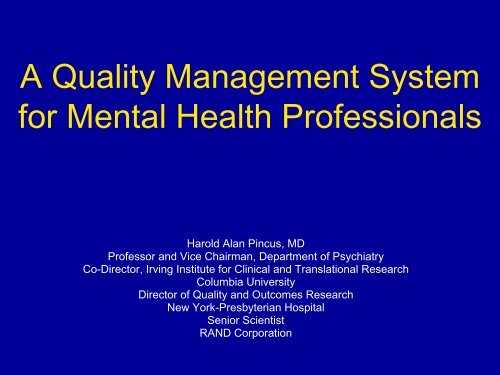
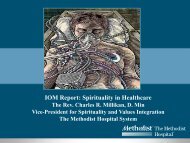


![Barry Davis Presentation.ppt [Read-Only] - Institute of Medicine](https://img.yumpu.com/31160415/1/190x146/barry-davis-presentationppt-read-only-institute-of-medicine.jpg?quality=85)
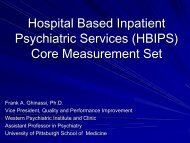
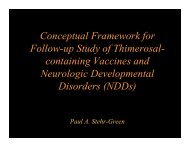
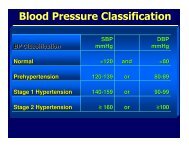
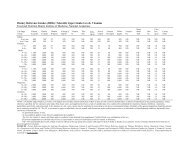


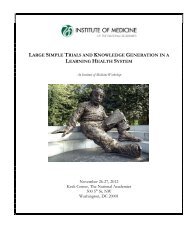
![Diekema.ppt [Compatibility Mode] - Institute of Medicine](https://img.yumpu.com/5085552/1/190x146/diekemappt-compatibility-mode-institute-of-medicine.jpg?quality=85)
